
THE VOICE OF INTERNATIONAL LITHUANIA
|
VilNews has its own Google archive! Type a word in the above search box to find any article.
You can also follow us on Facebook. We have two different pages. Click to open and join.
|
Archive for March, 2012
- Posted by - (0) Comment
11 March 1990 aftermath:
Gorbachev Warns Lithuania: Back Down or Face Blockade : Secession: His ultimatum gives the republic two days to rescind its independence moves or face a cutoff of oil and other vital goods

Mikhail Gorbachev,
Time Magazine (4 June 1990)
April 14, 1990|JOHN-THOR DAHLBURG | TIMES STAFF WRITER
MOSCOW — Soviet President Mikhail S. Gorbachev on Friday threatened the toughest action yet to quash Lithuania's month-old independence bid: an economic blockade of oil and other vital products if the breakaway Baltic republic does not reverse its challenge to Moscow's rule within two days.
Affairs are now at a "political dead end," Gorbachev and Prime Minister Nikolai I. Ryzhkov said in a toughly worded letter to the Lithuanian leadership. The letter, distributed by the official news agency Tass, betrayed the Kremlin's worry over the effects of Lithuania's continuing defiance of Moscow, including the danger of pro-independence contagion spreading to other regions.
- Bookmark :
- Digg
- del.icio.us
- Stumbleupon
- Redit it
- Posted by - (0) Comment
Michel Hazanavicius,
5 Oscar Prize winner,
is a French Litvak
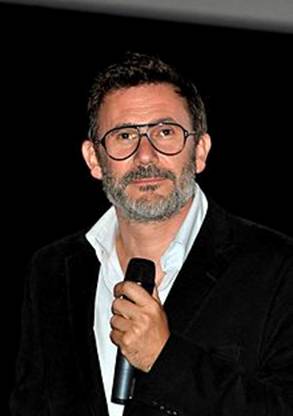
The French film maker and Director Michel HAZANAVICIUS (born in Paris, 1967), who won 5 Oscars in Los Angeles recently for his black and white sillent movie, The Artist, starring Jean Desjardins and Bérénice Bejo, is of Litvak descent.
His grand-parents emigrated from Lithuania to France in the 1920s.
- Bookmark :
- Digg
- del.icio.us
- Stumbleupon
- Redit it
- Posted by - (1) Comment
International Women’s Day in Lithuania:
Valentine’s Day instead of fighting for equality…
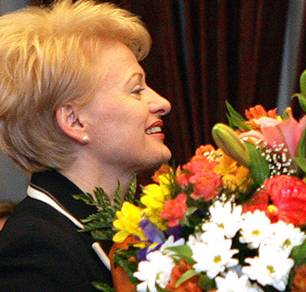
President Dalia Grybauskaitė
8th of March is International Women's Day, a day marked by women groups around the world. The day is rooted in the centuries-old struggle of women to participate in society on an equal footing with men. The idea of an International Women's Day first arose at the very beginning of the 1900s.
But in Lithuania the 8th of March is not at all characterized by women's struggle for emancipation and equality, or any sort of fighting against violence and abuse. Believe it or not, but here you will experience no single parade, no placates with demanding lines for equal rights, or any stirring speeches from women's rights activists.
The Soviet leaders were probably very anxious that the Women's Day could turn into a demonstration against the system and the many elderly, grey haired men at the top of the Kremlin. These men's smart move was to instead make the 8th of March a feast day, something in between Mother's Day and St. Valentine’s Day.
So, even today, two decades after the Soviet collapse, the 8th of March in Lithuania is the day when women receive presents, flowers, poems, text messages and lots of kind words and wishes from their men or lovers. While the 8th of March over the rest of the world makes the important point that this is a day for equality and justice between the genders, this is in Lithuania a day of romance and sweet music – a day when people celebrate more the difference than the equality between the genders.
- Bookmark :
- Digg
- del.icio.us
- Stumbleupon
- Redit it
- Posted by - (1) Comment
International Women’s Day in Lithuania:
Valentine’s Day instead of
fighting for equality…

President Dalia Grybauskaitė
8th of March is International Women's Day, a day marked by women groups around the world. The day is rooted in the centuries-old struggle of women to participate in society on an equal footing with men. The idea of an International Women's Day first arose at the very beginning of the 1900s.
But in Lithuania the 8th of March is not at all characterized by women's struggle for emancipation and equality, or any sort of fighting against violence and abuse. Believe it or not, but here you will experience no single parade, no placates with demanding lines for equal rights, or any stirring speeches from women's rights activists.
The Soviet leaders were probably very anxious that the Women's Day could turn into a demonstration against the system and the many elderly, grey haired men at the top of the Kremlin. These men's smart move was to instead make the 8th of March a feast day, something in between Mother's Day and St. Valentine’s Day.
So, even today, two decades after the Soviet collapse, the 8th of March in Lithuania is the day when women receive presents, flowers, poems, text messages and lots of kind words and wishes from their men or lovers. While the 8th of March over the rest of the world makes the important point that this is a day for equality and justice between the genders, this is in Lithuania a day of romance and sweet music – a day when people celebrate more the difference than the equality between the genders.

In 2010 President Dalia Grybauskaite used her address to the United Nations to call for much greater coordinated efforts to achieve global gender equality.
Violence against women
|
|
|
|
|
|
63.3 % of Lithuanian women have been victims of male physical or sexual violence or threats
after their 16th birthday. This represents today such a severe problem that, in my opinion,
President Grybauskaite should personally get involved and take the necessary measures
to turn around this devastating trend. Klaipeda municipality wants to be a pioneer-
municipality in terms of focus on domestic violence and abuse of women,
and I believe it could be a good idea for the President to support
these good efforts and make Klaipeda a positive show case for
constructive focus on domestic violence and
violence against women.

About women’s situation in Lithuania
- The Law on Equal Opportunities was adopted in 1999, but the system of implementation of the legislation and the mechanism of protecting women’s human rights are not sufficient enough to achieve optimal results.
- A very important step forward for the implementation of gender equality in Lithuania was done by the Government in 2003 by adopting the “National programme for Equal Opportunities for Women and Men 2003-2004” and 2005-2009.
- An inter-Ministerial Commission on Equal Opportunities for Women and Men was established in year 2000 to coordinate the implementation of the gender mainstreaming policy.
- In May 2009 Dalia Grybauskaite was elected Lithuania's first female president.
Lithuania has made it to the top-twenty list of countries worldwide in terms of security of equal opportunities for men and women, outmatching its neighbours and some of the EU’s old-timers.
According to the World Economic Forum that estimates economic, legal and social gaps between the genders, in 2007 Lithuania placed 14th, advancing by 7 places from 21 in 2006 as the BNS reported. Lithuania has been given a 72.3 percent score, while 100 percent means absolute equality and 0 percent — total discrimination. Latvia (73.3 percent) has moved up by 6 positions over a year to the 13th place, Estonia (70.1 percent) placed 30, one step above its position as of last year.

Population and families
- The number of women in Lithuania exceeds the number of men. There are 114 women per 100 men.
- The average life expectancy 78 years for women and 66 years for men.
- Divorced, widowed and single women make up 48% of all women, men - 39%. The proportion of women without spouse is not diminishing.
- A Lithuanian woman gives birth to her first child at the average age of 25. The proportion of women without a spouse is not diminishing.
- After divorces, about 10 thousand children remained without one of their parents (mostly they are with their mothers).
Education
- The number of women students in higher schools exceeds that of men students. There are 60% of women students and 40% of men students in higher schools. But among scientists 37% are women and among doctors habillis just - 15%.
- Distribution of students by gender is very diverse in different modules of education. Women students make up 75% of those studying social services and services for individual persons, 79% of those studying pedagogic and 79% - health care. In transport and security services, though, men students make up 87%, engineering - 81%, computing - 76%.
- The majority (86%) of pedagogues of general schools are women.
Employment and labour market
- Economic activity of women is lower than that of men. The activity indicator of men is 74%, while that of women - 66%.
- Unemployment rate of men (15%) is higher than that of women (13%). Women have limited possibilities to combine family life with participation in economic activity. 86 thousand women or 14% of all working women have part-time work (men 10%).
- The number of men and women by economic activity is rather varied. The majority of those working in health care are women as well as in social work and education, while men predominate in construction, electricity, gas and water supply.
- Managing positions in all economic activities are mainly occupied by men. For example, women constitute 86% of secondary school pedagogues, though directors of these schools are primarily men (62%).
- Women’s earning as percentage of men’s is 81.2%, in public sector 74.9% and in private sector- 85%. women are still make lower salaries than men. Women’s average gross wages per hour was 19.3 % lower than men’s wages In 2007. Women made up for 31 % of businesspeople in Lithuania in 2007, as compared with 26 % in 2006.
Participation in administration and decision-taking
- The number of women in the Seimas (Parliament) (11%) is markedly lower than that of men, in the Government (ministers vice-ministers and minister‘s advisers) - 28%, and in Municipality Councils - 21%.
- More men than women have their own business. About 40% of women have their own small or medium size enterprises.
- Women make up 37 % of all leaders in the Lithuanian ruling elite such as the parliamentarians, senior state officials and executives of companies and establishments

women trafficking
Lithuania has become in recent years a country of women export and transit between Eastern, Central and Western European countries. Poverty and unemployment force many women into prostitution. Different sources suggest that women from different social-demographical levels are involved in the sex-industry, mainly by young girls and women (average age – 24.5 years old) from so called risk groups. Experts claim that the geography in trafficking women from Lithuania is changing: if earlier it was Israel, Greece, United Arab Emirates, and Turkey, now main flows extend to Germany, Holland, Great Britain, France, Sweden, and Spain.
One of the problems in dealing with trafficking issues in Lithuania is lack of statistics and reintegration of victims into the society. As a public opinion survey done in 2002 by request of International Organization for Migration (IOM) suggests, up to 53.4% of Lithuanian people think “many” or “very many” girls are trafficked abroad to work as prostitutes by deceit, and 6.7% of people face this phenomenon in their close social environment, i.e. there were attempts made to traffic their close friend, relative, colleague, acquaintance. (“Trafficking in women: problems and decisions“ IOM, Institute for Social Research, 2004).

violence against women
Violence constitutes one of the most actual problems in Lithuania. Most people of Lithuania have suffered from violence at least once in their life. Males usually experience violence in public places, boys in parents’ families. Women are usually victims of sexual violence or violence in their own family…
Domestic violence
Violence, especially domestic violence, is one of the main problems women are facing in nowadays Lithuania.
Violence based on gender conflict, such as battering or any other domestic violence, sexual depravation and abuse, trafficking of women and children, forced prostitution and sexual harassment are incompatible with honour and dignity of a person.
There is lack of high-skilled officials, capable to assess situations of domestic conflicts, to find out sources for such behaviour and to assist victims or counsel the population in this field; insufficient training for judges, police officials, social teachers and social workers and doctors capable of dealing with violent men. Police and courts are avoiding the cases of domestic violence unless the victim is severely beaten or killed. All possible police measures against the perpetrator are very restricted and underused to protect the victim of violence.
The network of crisis centres providing support to victims of violence is insufficient. Many crisis centres were established and are operating on the initiative of non-governmental organisations. According to the data gathered by the Women’s Issues Information Centre, there now are 15 Crisis Centres and 6 Shelters for battered women, but they do not cover the whole territory of the country and only 2 of them are supported by Municipalities.
Crisis centres providing support to the victims of violence and working with perpetrators should be established following the territorial principle with active participation of municipalities.
A multiplex approach towards violence, covering support to violence victims, application of sanctions on perpetrators, awareness raising of the public, specialists and violence victims, education and training, law enforcement systems, strengthening the role of legal institutions and, health care, is still rather limited. Therefore, it is obvious that there is lack of appropriate complex programmes addressing the issues and covering the respective areas including coordination of actions of various public and non-governmental institutions.

Victim survey report – the sad reading
* 63.3 % of Lithuanian women have been victims of male physical or sexual violence or threats after their 16th birthday.
* 42.4 % of all married and cohabiting women have been victims of physical or sexual violence or threats of violence by their present partner.
* 53% of all women who had lived in relationships which had already terminated experienced violence or threats by their ex-partners.
* 11 % of Lithuanian women had at least once, after their 16th birthday, been victims of male physical or sexual violence or threats, perpetrated by a stranger, 8.2 % - by a friend, and 14.4 % by an acquaintance or relative.
* 71.4 % of Lithuanian women after their 16th birthday have been victims of sexual harassment or sexually offensive behaviour by a stranger, and 43.8% by a known man.
* 26.5 % of Lithuanian women after their 16th birthday had experienced sexual abuse by a stranger; 18.2 % by a known man; 17 % were attempted to be coerced into sexual intercourse by their date.
* 3.4 % of all victimised women reported that the experienced violence did not affect them, the absolute majority reported that this had caused hatred, helplessness, sorrow or other negative emotions.
* 10.6 % of the victims reported the most serious incident to the police.
* Women who were victimised in their parental families more often were victimised in their marital families; women whose mother was abused by the spouse, more often experienced violence by their spouses; men whose father had been violent against the mother, had been more often violent against their own partner.
* 75.3 % of adult Lithuanian women do not feel safe from risk of assault.
* 79 % of Lithuanian women believe that the home is the safest place for women and children.
Source: http://www.lygus.lt/ITC/files_smurtas/giedre1.doc
Dr. Giedrė Purvaneckienė
Aggression only moves in one direction – it creates more aggression
Margaret J. Wheatley
- Bookmark :
- Digg
- del.icio.us
- Stumbleupon
- Redit it
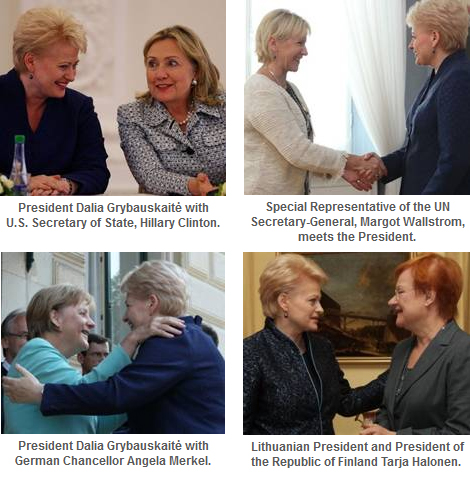
Last year Lithuanian President Dalia Grybauskaitė hosted several important meetings with ‘women issues’ on the agenda.
Leading women of the world met in the Presidential Palace on 30 June for the Conference Women Enhancing Democracy: Best Practices organized on the initiative of the Lithuanian President and President of the Republic of Finland Tarja Halonen.
On 1 July, President Grybauskaitė had meetings with U.S. Secretary of State Hillary Clinton, Kyrgyz President Roza Otunbayeva, Kosovo President Atifete Jahjaga, the EU High Representative for Foreign Affairs and Security Policy Catherine Ashton, and Special Representative of the UN Secretary-General on Sexual Violence in Conflict Margot Wallstrom.
- Bookmark :
- Digg
- del.icio.us
- Stumbleupon
- Redit it
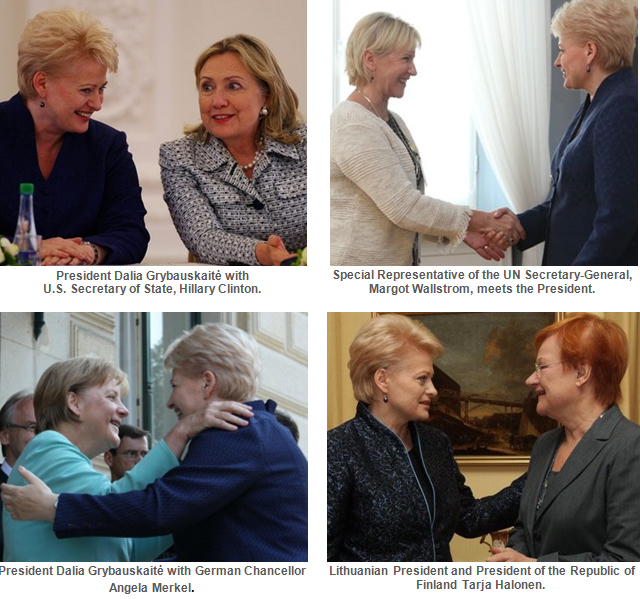
Last year Lithuanian President Dalia Grybauskaitė hosted several important meetings with ‘women issues’ on the agenda.
Leading women of the world met in the Presidential Palace on 30 June for the Conference Women Enhancing Democracy: Best Practices organized on the initiative of the Lithuanian President and President of the Republic of Finland Tarja Halonen.
On 1 July, President Grybauskaitė had meetings with U.S. Secretary of State Hillary Clinton, Kyrgyz President Roza Otunbayeva, Kosovo President Atifete Jahjaga, the EU High Representative for Foreign Affairs and Security Policy Catherine Ashton, and Special Representative of the UN Secretary-General on Sexual Violence in Conflict Margot Wallstrom.
Among the participants of the women's high-level conferences hosted in Lithuania for the first time ever was the President of Finland Tarja Halonen, President of Kyrgyzstan Roza Otunbayeva, President of Kosovo Atifete Jahjaga, President of Mongolia Elbegdorj Tsakhia, Speaker of Albania's Parliament Jozefina Çoba Topalli, Speaker of Latvia's Parliament Solvita Āboltiņa, Slovakia's Prime Minister Iveta Radičová, U.S. Secretary of State Hillary Clinton, also EU, UN and OSCE representatives, members of foreign national parliaments and governments, human and women's rights activists, and NGOs.
"I am very happy to welcome in Lithuania so many prominent women whose experience and achievements are an inspiring example to all women of the world. Vilnius will become a global focus centre, a venue for discussions on the most sensitive issues of democracy and equal opportunities, the results of which will provide guidance on how women's rights could be enforced and protected in the world," President Dalia Grybauskaitė said.
Women world leaders discussed ways to enhance women participation in political, economic and public life and to ensure equal opportunities of self-expression and career as well as measures to combat violence and trafficking in human beings.
In a meeting with Margot Wallstrom, Special Representative of the UN Secretary-General on Sexual Violence in Conflict, the President stated that Lithuania has been efficiently implementing, for several years, the National Strategy for Combating Violence against Women aimed at prevention of violence, assistance to victims and work with perpetrators. Much importance is attached to activities of women NGOs which provide assistance to women victims of violence.
Margot Wallstrom passed a message from the United Nations Secretary-General Ban Ki-moon, in which he underlined that the Conference initiated by the President is a significant contribution to the United Nations efforts to combat violence, trafficking in human beings and sexual violence in conflict. According to the Secretary-General, the United Nations stands ready to assist in delivering on the goals set by the Conference in Vilnius.
In the meeting, the UN Representative and the President discussed violence prevention programmes carried out in Lithuania. President Grybauskaitė mentioned the recent adoption of the law on protection against domestic violence as a significant step towards society without violence.
- Bookmark :
- Digg
- del.icio.us
- Stumbleupon
- Redit it
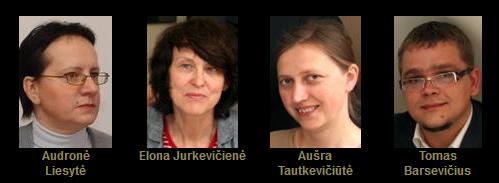
The Klaipeda Municipality tem planning the new crisis centre for women:
· Ms. Audronė Liesytė, Head of Social Care Division
· Ms. Elona Jurkevičienė, Head of Project Division
· Ms. Aušra Tautkevičiūtė, Chief Specialist of Construction and
Infrastructure Development Division
· Mr. Tomas Barsevičius, Chief Specialist of Project Management
Subdivision, Project Division
One of the biggest problems that Lithuania faces today is violence against women. Statistics claims that 63% of all women in Lithuania suffered from physical and/or psychological violence, whereas world average is 33%.
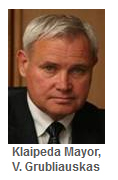 Klaipėda becomes a pioneer in this social blind spot
Klaipėda becomes a pioneer in this social blind spot
In an interview with Klaipeda’s Mayor Vytautas Grubliauskas last year, I asked him if he thought Klaipeda could be a good example for other Lithuanian municipalities with regards to this very severe problem.
The mayor answered:
“Thanks to funds from Espersen Foundation, Klaipėda becomes a pioneer in this social blind spot. What we will see with rise of this building, however, is not a problem solution, only a shelter for severe societal problems. Although the shelter is extremely needed, Klaipėda will never be an example if violence will persist. Therefore I see immediate need for social evolution towards extermination of violence against women in general. For that we need awareness campaigns and education from early school age. Only with such package of measures I will be able to call Klaipėda as good example for other municipalities.”
Lithuania's port city has for years had a women's shelter for women, but has now taken a huge step forward and is already well underway with the planning of what is probably going to be Lithuania's most modern and advanced crisis centre for women. The new centre is expected ready summer 2012.
- Bookmark :
- Digg
- del.icio.us
- Stumbleupon
- Redit it

The Klaipeda Municipality tem planning the new crisis centre for women:
· Ms. Audronė Liesytė, Head of Social Care Division
· Ms. Elona Jurkevičienė, Head of Project Division
· Ms. Aušra Tautkevičiūtė, Chief Specialist of Construction and Infrastructure Development Division
· Mr. Tomas Barsevičius, Chief Specialist of Project Management Subdivision, Project Division
One of the biggest problems that Lithuania faces today is violence against women. Statistics claims that 63% of all women in Lithuania suffered from physical and/or psychological violence, whereas world average is 33%.
 Klaipėda becomes a pioneer in this social blind spot
Klaipėda becomes a pioneer in this social blind spot
In an interview with Klaipeda’s Mayor Vytautas Grubliauskas last year, I asked him if he thought Klaipeda could be a good example for other Lithuanian municipalities with regards to this very severe problem.
The mayor answered:
“Thanks to funds from Espersen Foundation, Klaipėda becomes a pioneer in this social blind spot. What we will see with rise of this building, however, is not a problem solution, only a shelter for severe societal problems. Although the shelter is extremely needed, Klaipėda will never be an example if violence will persist. Therefore I see immediate need for social evolution towards extermination of violence against women in general. For that we need awareness campaigns and education from early school age. Only with such package of measures I will be able to call Klaipėda as good example for other municipalities.”
Lithuania's port city has for years had a women's shelter for women, but has now taken a huge step forward and is already well underway with the planning of what is probably going to be Lithuania's most modern and advanced crisis centre for women. The new centre is expected ready summer 2012.
The municipality has been joined by EU and a Danish fund, the Espersen Foundation, to finance the project, and everything is now arranged for Klaipeda to have a women's shelter most other Lithuanian municipalities should study further as soon as possible. For the problem of violence against women is an extremely serious, nationwide problem that needs immediate attention from authorities, communities and the very families throughout every corner of the country!
Let me also say that I consider it admirable that the Espersen Foundation so actively contributes financially and otherwise in a community where the foundation's commercial arm, the Espersen Fish Factory, during the last few years has built up a state of the art fish processing company that provides jobs to a large number of production workers and several external companies within fishery, transportation and more. Klaipeda has for years benefited from this company's investments, and the company is now in an exemplary way also showing how commercial businesses can demonstrate social responsibility and involvement in the communities in which they are established and located.
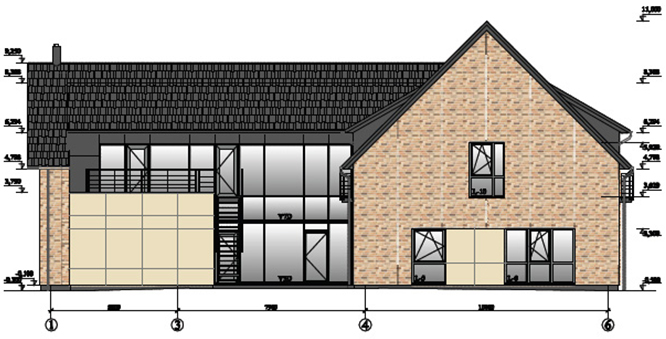
FAÇADE OF THE PLANNED CRISIS CENTRE BUILDING
Architects: NEOFORMA, Klaipeda.
Aage Myhre
aage.myhre@VilNews.com
- Bookmark :
- Digg
- del.icio.us
- Stumbleupon
- Redit it
Will the power of women save the world?
- Posted by - (0) Comment
![]()

Stories of Faith by Clark Eberly
According to the Worldwide Guide to Women in Leadership, women are currently serving as president, prime minister or chancellor of Ireland, Finland, Germany, Liberia, India, Argentina, Australia, Bangladesh, Iceland, Croatia, Lithuania, Kyrgyzstan, Costa Rica, Trinidad and Tobago, Slovakia and Brazil.
When else in human history have so many nations been led by so many women at the same time?
In his book, As a Peace-Loving Global Citizen, Rev. S.M. Moon writes:
“Throughout history, women have been persecuted, but I predict this will change. The coming world will one of reconciliation and peace based on women’s maternal character, love, and sociability. The time is coming when the power of women will save the world.”
This is a rather wonderful and optimistic assertion. Can the motherliness and compassion for which women are often noted become effective enough to turn the world in a better direction? Are there enough women who are wise enough, capable enough and kind enough to make a difference, and can women rise in influence, not in competition with men, but working together with them to build a better earth?
- Bookmark :
- Digg
- del.icio.us
- Stumbleupon
- Redit it
“God lives there, where people worship ladies”
- Posted by - (0) Comment
It’s very unfortunate that ladies are so maltreated. I was thinking that in our country due to lack of education ladies are mal treated but it sorry to know that educated people are also treating as illiterate ,please stop it ,in our country it is said “god lives there, where people worship ladies”
Udhir Sajwan
- Bookmark :
- Digg
- del.icio.us
- Stumbleupon
- Redit it
- Posted by - (0) Comment
Lithuanian fined for Facebook comment:
“What we need is another Hitler to exterminate those fags ‘cause there’s just too many of them multiplying.”

Vladimir Simonko of the Lithuanian Gay League (LGL): “The complaint filed was a result of our regular monitoring of the media for hate speech.
A Lithuanian man, 37, has been fined nearly $600 after commenting on Facebook for “another Hitler” to kill gays. PinkNews.co.ukreported that the Lithuanian Gay League (LGL) alerted authorities to his post.
He had commented under an article on Facebook about Lady Gaga’s criticism of the Lithuanian government. He wrote, “What we need is another Hitler to exterminate those fags ‘cause there’s just too many of them multiplying.”
- Bookmark :
- Digg
- del.icio.us
- Stumbleupon
- Redit it
![]()

Emerging markets have taken noteworthy steps in advancing opportunities for women in the past year, according to the Economist Intelligence Unit (EIU). This is one of the conclusions of the Women’s Economic Opportunity (WEO) Index 2012, which measures specific attributes of the environment for women employees and entrepreneurs in 128 countries.
The findings include:
• Little change over the past year at the top and bottom of the Index. Sweden and Norway, with strong, gender-sensitive legislation and progressive cultural norms, remain at the top, while Chad and Sudan, which have scarce legal, educational and financial resources for women, stayed at the bottom.
• Lithuania and the Slovak Republic tied for the most improved score – an increase of 7.2 points – with gains in multiple areas.
- Bookmark :
- Digg
- del.icio.us
- Stumbleupon
- Redit it
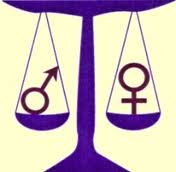
I was glad to see the last issue of VilNews concentrate on 'women's issues' (a phrase which many Lithuanians would think to refer to PMS).
It is good to know something is being done to combat violence against women in Klaipeda, hopefully the other cities, towns and villages will follow its lead.
I lived in Lithuania for over 18 years and the safety issue cropped up multiple times. I am not even talking about generous amounts of everyday sexism - even though my friends and family who live in Lithuania don't see my views on equality as radical, they are sceptical as to the practical implementation of such in the current society. My friends in the UK found it deeply shocking when I revealed that at my schools in Vilnius there was a separation in lessons of Crafts - girls were sent to do sewing and embroidery, whereas boys would do woodwork. It is also still widely believed that if a woman wears a short skirt, she is asking to be sexually abused or harassed.
The whole mindset of the society has to and is bound to change, but for it to happen so the stricter enforcement of laws is necessary and the fight for women's rights should not be limited to small groups working at grassroots level. I also strongly believe that some more social awareness campaigns would not go amiss. There needs to be some real support for women who choose to challenge inequality in educational establishments, workplaces and their everyday surroundings. Maybe then voices challenging sexism and abuse would be heard, rather than ridiculed.
Agne Barysaite,
London
- Bookmark :
- Digg
- del.icio.us
- Stumbleupon
- Redit it
- Posted by - (0) Comment
VilNews focus in March-April
Healing the wounds
between LT-Americans
and the homeland
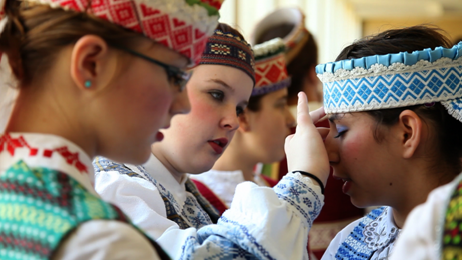
Photo: National Lithuanian American Hall of Fame
Aage Myhre, Editor-in-Chief
aage.myhre@VilNews.com
The relationship between Lithuania’s diaspora groups in the U.S. and the home country Lithuania is not always the best. Many here in Lithuania still believe that those who left, whether for economic or political reasons, had very comfortable lives compared to those who stayed behind and had to fight through several decades of inhuman oppression and abuse by the Soviet occupiers.
Many Lithuanians in the United States believe in turn that the mother country does not welcome them to return or collaborate on improving the development of the nation called Lithuania, and have been critical about ongoing corruption, that rule of law is still not working effectively, etc.
VilNews will through the second half of March and early April focus on this topic, and we hereby invite all with views to prepare posts; in the form of blogs, comment articles or information you think might shed light or be of benefit to the relationship. The goal is to build bridges and contribute to reconciliation!
These are some of the challenges and opportunities we face:
1.
Lithuanian-Americans played a significant role in the post-war years, until Lithuania's recovered independence in 1990-1991, by constantly exerting pressure on the U.S. President and leaders in other Western countries so that they would pressure the Soviet Union to allow the Baltic countries freedom after the Soviet occupation that took place during World War II. Now, as more than 20 years have passed since the freedom bells rang, the question is whether the Lithuanian-Americans have a role to play also today? See our article https://vilnews.com/?p=8899
2.
“The majority, I believe, are disappointed and discouraged with the present president’s seemingly unfriendly view toward Lithuanian-Americans and others abroad.” This said Regina Narusiene, President of the World Lithuanian Community, in a recent interview (see https://vilnews.com/?p=6704), based on a comment referred to in The Baltic Times, where President Grybauskaite should have said that most prominent U.S. Lithuanian émigrés, instead of focusing on developing U.S. - Lithuanian business ties, prefer providing political advice to the Lithuanian authorities, which may not be that necessary nowadays. She was supposedly “disappointed by Lithuanian émigrés’ inability to attract U.S.-based investments to Lithuania.” Here in VilNews we often hear Lithuanian-Americans say they do not feel welcome to their home country, and that Lithuania's current president seems to antagonize them. What are our readers’ comments to this?
3.
In a VilNews interview Regina Narusiene told about her youth in Chicago, after she and her family had settled there after escaping from Lithuania in 1944. One of the things she said, was: “I realized that my father was afraid of informers who could make life difficult for us, for our relatives who remained in Lithuania, and for the Lithuanian partisans who kept on fighting against the Soviet occupants well into the 1950s. The KGB had their own spies within the Lithuanian communities in the U.S., so we were extremely careful with what we said outside the home." Now, when the KGB archives have been made public, are there new traces of KGB post-war activities to be found also in the U.S.?
4.
In a meeting at the Lithuanian Embassy in Washington last year, representatives of LAC (Lithuanian American Council) expressed their concern on a wide range of topics including Lithuania's developing energy policy, the country’s image in the international community, emigration issues and their demographic impact, the prospect of maintaining citizenship rights of recent immigrants, ongoing cooperation between organizations of the Diaspora and Lithuania, and minority issues in Lithuania. LAC representatives suggested that Lithuania would benefit significantly by availing itself of the expertise and knowledge found in the Diaspora communities in developing energy and security policies and a host of other areas such as environmental issues, ecology, medicine, economic development, and the promotion of improved interactions between the government and the people through non-governmental organizations (ref. https://vilnews.com/?p=5031). Has there been any official Lithuanian response to this?
5.
In November 2011, the Jewish Lithuanian Heritage Project hosted a roundtable “Think Tank” at the Lithuanian embassy in Washington. The theme of the discussion was, "A comprehensive Five Year plan to improve Lithuanian-Jewish relations: Cultivating Sunflowers." (ref. https://vilnews.com/?p=9949). In a response, one of our readers wrote: “Is this about the establishment of a new Judenrat to apologize for Lithuanian anti-Semitism? “If truth be told” having a holiday party at Lithuania’s D.C. Embassy is not revolutionary. What would be revolutionary would have been, and would be, is the prosecution of Lithuanian collaborators and SS members, the prosecution of today’s neo-Nazi youth groups, reinstatement of the ban against the display of the swastika and ending the noxious practice of the Uzgavenes holiday when people dress as Jews and beg on the street.” Harsh words?
- Bookmark :
- Digg
- del.icio.us
- Stumbleupon
- Redit it
![]()

Aldona Martin (Martusevicius),
Australia
Am interested to know whether you have historical info/references re Lithuania's history with India, ( with Lithuanian language being based on Sanskrit). Also met a couple from India recently who remarked that my name Aldona is the name of a suburb in the Indian City of GOA... I remember my Lithuanian father relating to me when I was a teenager that Lithuania extended south to India, some centuries ?? ago...perhaps I was not listening / interested at the time...are you able to clarify/provide info ??
Would be most grateful...
From the Editor:
Please write us with any information that could be of help for Aldona. Write to editor@VilNews.com
- Bookmark :
- Digg
- del.icio.us
- Stumbleupon
- Redit it

Also wish to commend you on the outstanding work that you do in bringing us, amazingly interesting articles on such a variety of subjects, together with photographic masterpieces....am now more and more interested in the history of my Fatherland, which I was blessed to visit in 2009 for my first visit and to walk in the footsteps of my ancestors.
My heartfelt thanks to you for your interest and dedication..
Aldona Martin (Martusevicius)
Australia
- Bookmark :
- Digg
- del.icio.us
- Stumbleupon
- Redit it
VilNews e-magazine is published in Vilnius, Lithuania. Editor-in-Chief: Mr. Aage Myhre. Inquires to the editors: editor@VilNews.com.
Code of Ethics: See Section 2 – about VilNews. VilNews is not responsible for content on external links/web pages.
HOW TO ADVERTISE IN VILNEWS.
All content is copyrighted © 2011. UAB ‘VilNews’.

 Click on the buttons to open and read each of VilNews' 18 sub-sections
Click on the buttons to open and read each of VilNews' 18 sub-sections 



















.jpg)



